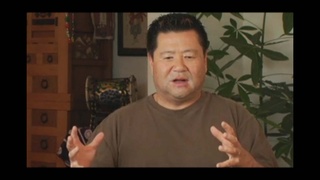Interviews
Finding parallels through art
Well, I think any artist has the ego to think that what we’re doing is so important everyone else should listen to us. And there’s this thing of like, “Is your art self-indulgent?” But I always felt like the more personal I got with my own stories and the more detailed I got about my own story, the more people would find parallels for their own life. And I thought that was really an important lesson for me to learn. In fact, one of the few fan letters I’ve ever gotten that I’ve kept was from a guy when I performed at Highways Space nearby here in Santa Monica, where he wrote me a letter after I performed there, and he said, “I can’t believe how much you growing up Hapa in Southern California was like me growing up gay in Texas.” And I thought that was a really great compliment because it meant that somehow there was some parallel between us. And that’s what I’m trying to do.
Date: May 3, 2006
Location: California, US
Interviewer: Jim Bower
Contributed by: Watase Media Arts Center, Japanese American National Museum.
Explore More Videos







Advantages of being Nikkei (Spanish)
(b. 1950) Nisei Chilean, Businessman


Childhood shame for being Nikkei in Enumclaw, Washington
Judge, only Japanese American to serve on CWRIC.

On the Impact of the Camp Experience
(b. 1942) The first Asian American woman judge

Thoughts on the term, "Nikkei"
(b. 1949) Musician and arts educator and adminstrator.

Post-redress future of Japanese Americans
Judge, only Japanese American to serve on CWRIC.



Need generational change in Japanese community (Spanish)
(1925-2014) La Plata Hochi, Journalist
